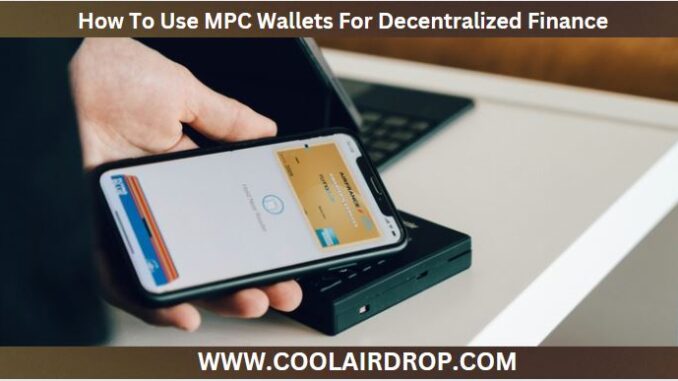
How To Use MPC Wallets For Decentralized Finance: Multi-Party Computation (MPC) wallets are revolutionizing the way crypto enthusiasts secure their assets. Unlike traditional wallets, MPC wallets split your private key into multiple parts and distribute them across independent validators. This ensures no single entity has complete control over your funds, reducing the risk of theft or unauthorized access.
With HOT Protocol, MPC wallets take security a step further by:
- Using end-to-end encryption to protect communication between nodes and users.
- Allowing transactions to be signed without revealing the full private key.
- Offering two-factor authentication (2FA) for an added layer of security.
This unique approach makes MPC wallets ideal for decentralized finance (DeFi) and Web3 applications.
What Technology Allows MPC Wallets to Split Private Keys Securely?
The underlying technology behind MPC wallets involves advanced cryptographic algorithms. These algorithms enable secure key-sharing and signing without ever exposing the full private key. HOT Protocol uses cutting-edge protocols to ensure:
- Key Sharding: Private keys are split into shares stored by independent validators.
- Threshold Signatures: Transactions require a predefined number of validators to approve them, ensuring decentralized control.
- End-to-End Encryption: All communication between users and validators is encrypted for maximum privacy.
By leveraging these technologies, HOT Protocol ensures your wallet remains secure, even in the face of sophisticated cyberattacks.
What Is Web3 MPC?
Web3 MPC refers to the integration of Multi-Party Computation technology within the Web3 ecosystem. It allows users to manage their crypto assets securely while interacting with decentralized applications (dApps) and DeFi platforms.
Key Features of Web3 MPC:
- Decentralized Security: No single point of failure.
- Cross-Chain Compatibility: Seamless asset transfers across blockchains.
- Customizable Access: Developers can integrate social recovery, 2FA, and more.
With HOT Protocol, Web3 MPC wallets empower users with unparalleled security and flexibility.
Is an MPC Wallet Safe?
Yes, MPC wallets are among the safest options for storing and managing cryptocurrencies. HOT Protocol’s MPC wallets provide several layers of security, including:
- Decentralized Key Management: Private keys are split and stored by independent nodes.
- Two-Factor Authentication (2FA): Options include SMS, email, Google Authenticator, and fingerprint.
- Trusted Validators: Nodes are operated by reputable partners like EverStake, NEAR Protocol, and HOT DAO.
By combining these features, HOT Protocol ensures your assets are secure from hacking and unauthorized access.
What Does the MPC Stand For?
MPC stands for Multi-Party Computation. This cryptographic method allows multiple parties to jointly compute a function without revealing their individual inputs. In the context of crypto wallets, MPC ensures:
- Private Key Security: Your private key is never exposed in its entirety.
- Decentralized Control: Multiple validators are required to sign transactions.
- Enhanced Privacy: Your data remains confidential throughout the process.
Discover the full potential of MPC technology with HOT Protocol.
How to Create an MPC Wallet?
Creating an MPC wallet with HOT Protocol is simple and user-friendly. Here’s how you can get started:
- Visit HOT Protocol: Go to HOT Protocol’s official website.
- Sign Up: Create your wallet using email, SMS, or another secure method.
- Enable 2FA: Add an extra layer of security with options like Google Authenticator or fingerprint.
- Start Managing Assets: Transfer crypto, connect to dApps, and explore DeFi seamlessly.
HOT Protocol makes it easy for anyone to access the benefits of MPC wallets.
How Do I Create a Decentralized Wallet?
A decentralized wallet allows you to control your crypto assets without relying on centralized entities. HOT Protocol’s MPC wallet is the perfect example of a decentralized wallet. Follow these steps to create one:
- Choose Your Wallet Provider: Visit HOT Protocol.
- Set Up Your Wallet: Use HOT’s intuitive interface to create an MPC wallet.
- Secure Your Account: Enable features like 2FA and social recovery.
- Start Using dApps: Connect to your favorite decentralized platforms with ease.
Decentralized wallets like HOT Wallet ensure full ownership and control of your assets.
What Is the MPC Signing Algorithm?
The MPC signing algorithm is a cryptographic process that enables secure transaction signing without exposing the private key. It works by:
- Splitting the private key into shares held by independent validators.
- Combining these shares to produce a valid signature for transactions.
- Ensuring no validator can reconstruct the full private key on their own.
HOT Protocol’s implementation of the MPC signing algorithm guarantees secure and efficient crypto transactions. Learn more at HOT Protocol.
What Is Multi-Sig Wallet vs MPC?
Multi-Sig Wallet:
- Functionality: Requires multiple signatures from predefined parties to approve a transaction.
- Use Case: Commonly used for joint accounts or organizational funds.
- Limitation: Centralized control and higher complexity.
MPC Wallet:
- Functionality: Splits the private key among independent validators for decentralized signing.
- Use Case: Ideal for individual users and DeFi applications.
- Advantage: Enhanced security and privacy through decentralization.
While both wallets offer multi-party control, MPC wallets like those from HOT Protocol provide superior security and flexibility.
Why HOT Protocol Is the Future of Web3 Wallets
HOT Protocol is redefining decentralized finance with its innovative features:
- MPC Wallets: Secure and user-friendly wallets with advanced 2FA options.
- Cross-Chain Bridging: Transfer assets between blockchains in 30 seconds.
- Omni-Tokens: Unified balances across multiple chains with gas-free swaps.
- Developer Tools: Build custom wallet solutions and dApp integrations.
Don’t miss out on the next generation of crypto wallets. Visit HOT Protocol and experience the future of decentralized finance today.
Conclusion
MPC wallets are transforming the way we interact with Web3 and DeFi. By combining advanced cryptography, decentralized control, and user-friendly features, HOT Protocol offers a secure and seamless experience for crypto enthusiasts and developers alike.
Take control of your crypto journey with HOT Protocol.

Leave a Reply